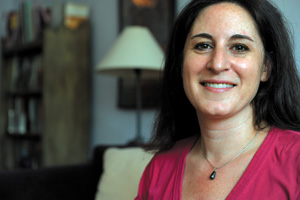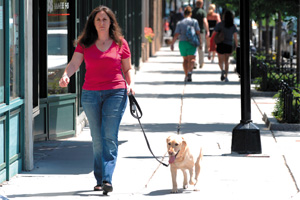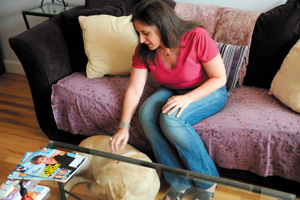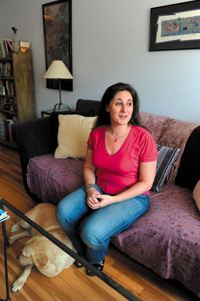 It’s how you tweet people
It’s how you tweet people
Getting laid off pushed a marketing expert to use Twitter,
Facebook, and other social-networking tools for her job search—
tools that became her new area of expertise.
By Rachel Levy, MBA'98
Photography by Dan Dry



Rachel Levy, MBA'98
Last spring I went in for my performance review thinking I’d get at worst a good review, at best a promotion. My boss at the Jewish Community Centers of Greater Boston had previously shown me a new organizational chart with positive changes for me. Yet when I stepped into her office and saw the CFO there too, I knew something was wrong. Indeed, rather than moving me up, they were laying me off. I had one month to leave my job.
I felt blindsided. After crying to my closest friend at work, I pulled myself together and stepped into action mode, posting my résumé on Monster.com and other sites. By midafternoon the emotion swept over me again. “I can’t be here,” I said. “I can’t think.”
Back at my Brookline condo, Stella, my 70-pound yellow Lab, greeted me as she always does. The rest of my world might have been in turmoil, but at least I could count on Stella shaking her bum, licking me, and lying on the floor while I spent the rest of the day on the couch. “Mommy lost her job,” I told her. “What am I going to do?” She let me pet her back and cuddle as much as I needed.
Unlike Stella, my parents—whom I love dearly—could verbally respond to my news. My father had spent 37 years at Arthur D. Little and a successor company doing management consulting. To him it was a blot on one’s résumé to lose a job, no matter the circumstances.
In the past I’d never had trouble finding work. After studying business and economics at Skidmore College, I moved back to Boston and became an auditor at Coopers & Lybrand, then did accounting at Avid Technology. Looking for something more creative, in 1996 I moved to Chicago for my MBA, and afterward I stayed in the city, doing marketing and brand management for Abbott Laboratories, Kraft Foods, and Jim Beam Brands. By then I’d been in Chicago for nine years and felt the itch to be closer to my family: parents, sister, brother-in-law, and my adorable young nieces.
So in 2005 I moved back to Boston and took a year off before accepting a position as the Boston-area JCC’s director of marketing. A year later I bought a condo—one that accepted dogs. Getting a dog was a luxury my long work hours and commute in Chicago didn’t allow. So I trolled the Petfinder Web site and found Stella, then a year-and-a-half, at a Tennessee shelter. Although I didn’t meet her before she showed up in New Hampshire to come home with me, I took the risk. Best move I ever made. She’s incredible—doesn’t jump, doesn’t bark, doesn’t chew anything, and she’s incredibly loyal. I can take her off the leash at Starbucks, and she stays at attention beside my table. I’m her world, even more than other dogs I see with their owners.
Meanwhile I enjoyed my job, where I was tasked with making the JCC a few new Web sites and a stronger brand. I thought I did a great job. Yet two years later I had that fateful meeting. Since then about eight other JCC employees have lost their jobs too.
When I got laid off, I wasn’t exactly a social-media novice, but I had used it for personal purposes, not for business or networking. I signed up for a Twitter account in April 2008, but only a few people I knew were on it, so I didn’t see the point. When a young-professional nonprofit board I’m on decided to use Facebook as a marketing tool in 2006, I signed up a bit reluctantly. I thought I was already good at keeping tabs on my friends. But I quickly got addicted, posting photos of my nieces, updating my status, and generally keeping in touch with friends. I had joined LinkedIn in 2004. Heck, I was on JDate even earlier.
Yet after losing my job, I realized my marketing skills had been quite old school. So that summer, when I found out about an online-marketing summit, I wrote the organizers explaining I was out of work, and they let me come for free. The speakers there talked a bit about Twitter and a lot about social media in general. I was completely overwhelmed with how much I didn’t know about the online world. I didn’t know about search-engine optimization. I didn’t know about using social media for business purposes. I didn’t know about online advertising. Stumble Upon. Digg. Delicious.
Then in September I attended a two-day conference, the New Marketing Summit—I don’t remember how, but I got another free ticket. The conference was filled with big names in the social-media world, and everyone had a laptop or smart phone out. I only had a Motorola flip phone. At least 75 percent of the people were tweeting—using 140 characters or less to post key points or to message each other: “What did you think of that speaker?” “Good point, but I think Twitter will stay around for a long time.” “I’m going to Dunkin’ Donuts. Want something?” I felt like I was on a different planet.

Rachel Levy, MBA'98
A woman who lives in my building was at the conference and encouraged me to get back on Twitter. She even came up with a new Twitter name for me—@BostonMarketer. That night I went home and returned to my account, and the next day I showed up with my laptop. I started following anyone who was tweeting at the conference. I followed all the speakers. And a lot of them followed me back.
After that day, I began to use Twitter as an educational tool—people posted interesting articles on social media, so I read up. Then it became more about networking with a whole different group of people than I’d already contacted through my regular networking efforts. After a month I started writing to users I respected, asking if we could get together for coffee. Nine times out of ten they said yes. And then people began to pass me job openings they knew about.
To help pay the bills I got a steady babysitting job, then did some dogsitting. I already took Stella out three times a day, so I figured I might as well take care of another dog. For two months this spring, I had other dogs in the house almost constantly. Poor Stella was a little sensitive about it, though. One dog would sniff and poke and lick her all the time, and she’d just get up and move somewhere else, or burrow between my legs and the desk.
I also did some marketing and social-media consulting, even finishing a project I had started at the JCC. For another client, when Goody’s retailer went out of business, I found supporters of the brand to help sell the name.
All the while I was building my online persona. In November 2008 I began a blog about my job search, social networking, and marketing. I sought out interesting articles and posted them on Twitter and Facebook. I also retweeted good posts, which not only spreads information but also is a compliment to other users. I attended Tweetups—social events at bars and restaurants or networking events with speakers or panels—to take my online relationships offline and put faces to the names I’d been interacting with.
People think Twitter is just about telling people you’re having a cup of coffee, but it’s so much more. My favorite example: Diane Hessan, the CEO of Communispace, followed me on Twitter, and by chance I recognized her name from a Harvard Business School panel I had planned to attend. I sent her a private message saying that I looked forward to meeting her at the panel. By the time she wrote back, she had read my profile and my Web site. After her panel she had a bunch of people around her, but when I introduced myself, she stopped talking to meet me and to take my résumé. Although she didn’t have a job available, she brought me in to meet people at her office.
As I became well versed in social media, I taught a class at a consulting firm, gave a webinar on using Twitter, and showed private clients how to use it. I have 5,500 followers—considered a lot before people started gaming the system and celebrities inflated the numbers. I contributed to a book called Twitter Marketing: An Hour a Day (Wiley), set for December release. I wrote for the Wall Street Journal’s Laid Off and Looking blog and was quoted in Boston Globe and NPR stories about dating while out of work.
I did get job interviews—one every couple of weeks if you count phone interviews. There was one job I really thought I would get, so I delayed a WSJ post, hoping to write about the offer. It didn’t come through. Lesson: don’t discuss a job with family and friends until it’s a sure thing.
I got back on JDate recently, and Twitter has even infiltrated that aspect of my life. One July Friday night a date was 40 minutes late picking me up, so I tweeted that. I got about five responses saying, “Forget him, he’s not worth it.” When he arrived, we went to a movie in the park and had a great time, so I told him about the tweets. He took my phone and apologized over Twitter. My followers thought it was funny and wrote, “Thanks for including us in your date!”
Today my JDate profile seems disconnected with my newer online self. I posted it long ago and kept it pretty private—no last name, no phone number—because I was wary of online crazies. My Twitter/blog profile, meanwhile, is so public. If you know my Twitter name, you can easily find where I went to college, where I take Stella to the park—a huge amount of information. I haven’t yet resolved my split online personality.
My big news is that I finally got a job. A year to the day after leaving the JCC, I was hired as director of marketing and social media for Second Time Around, a clothing consignment retailer with 21 stores in the east and a rapid expansion plan. They have a start in social media, but there’s still much to do. I’ll miss being home with Stella every day, but I imagine she’ll be glad to have an employed mom to shake her bum for when I walk through the door.
When I accepted the job, I blogged about how I got it through old-fashioned networking. A woman who’d previously contacted me for a consulting project passed my name to her brother-in-law, who worked at a venture-capital firm that had invested in Second Time Around. A month later, I was offered the job. The best part: I’d forgotten that the woman had originally found me through—what else—Twitter.
Chicago’s career services
Career Advising & Planning Services
Career counseling, job postings, workshops, career fairs, Alumni Careers Network
773/702-7040
University of Chicago Booth School of Business
Job postings, one-on-one coaching, mock interviews, workshops
312/464-8677
